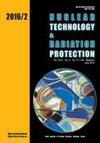Review of the thermoluminescent dosimetry method for the environmental dose monitoring
IF 0.9
4区 工程技术
Q3 NUCLEAR SCIENCE & TECHNOLOGY
引用次数: 3
Abstract
Passive solid state dosimeters, such as thermoluminescence dosimeters, provide integrated measurement of the total dose and are widely used in environmental monitoring programs. The objective of this paper is to provide a comprehensive review on the use of thermoluminescent dosimetry methods for monitoring radiation dose in the environment. The article presents the part of the research results of the project PREPAREDNESS (EMPIR 2016 call for Metrology for Environment joint research project) with a particular objective to harmonize procedures used by dosimetry services, relevant authorities and Institutes across the Europe. To achieve this, different monitoring routines that are based on passive environ mental dosimetry methods are investigated. Differences in performing specific steps such as preheating, reading, annealing, minimizing fading, and others, are analyzed. The investigation was performed by means of qualitative literature review that showed the lack of information about specific steps. The conclusion of this work is that thermoluminescent dosimetry measurement system has to be type-tested even though the testing procedure is complicated. In addition to this, control dosimeters should be introduced, International Organization for Standardization protocols should be followed during calibration, and finally, parameters influencing the measurement uncertainty have to be identified and well understood in order to pro duce ac cu rate dose measurement results.热释光剂量法在环境剂量监测中的研究进展
被动固体剂量计,如热释光剂量计,提供了综合测量的总剂量,并广泛应用于环境监测方案。本文就热释光剂量法在环境辐射剂量监测中的应用作一综述。本文介绍了项目准备(EMPIR 2016年环境计量联合研究项目)的部分研究成果,其特定目标是协调整个欧洲剂量测定服务、相关当局和研究所使用的程序。为了实现这一点,研究了基于被动环境剂量法的不同监测程序。在执行具体步骤,如预热,读取,退火,最小化衰落等差异进行了分析。调查是通过定性文献回顾的方式进行的,这表明缺乏关于具体步骤的信息。本研究的结论是,尽管热释光剂量测量系统的测试程序复杂,但必须进行型式测试。除此之外,还应引入控制剂量计,在校准过程中应遵循国际标准化组织的规程,最后,必须确定和充分了解影响测量不确定度的参数,以便产生交流速率剂量测量结果。
本文章由计算机程序翻译,如有差异,请以英文原文为准。
求助全文
约1分钟内获得全文
求助全文
来源期刊

Nuclear Technology & Radiation Protection
NUCLEAR SCIENCE & TECHNOLOGY-
CiteScore
2.00
自引率
41.70%
发文量
10
审稿时长
6-12 weeks
期刊介绍:
Nuclear Technology & Radiation Protection is an international scientific journal covering the wide range of disciplines involved in nuclear science and technology as well as in the field of radiation protection. The journal is open for scientific papers, short papers, review articles, and technical papers dealing with nuclear power, research reactors, accelerators, nuclear materials, waste management, radiation measurements, and environmental problems. However, basic reactor physics and design, particle and radiation transport theory, and development of numerical methods and codes will also be important aspects of the editorial policy.
 求助内容:
求助内容: 应助结果提醒方式:
应助结果提醒方式:


